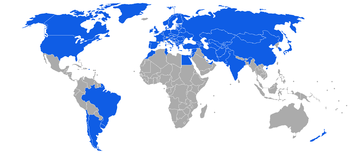
International Road and Transport Union (IRU)
Encyclopedia

History
The International Road Transport Union (IRU) was founded in Geneva on 23 March 1948, one year after the United Nations Economic Commission for EuropeUnited Nations Economic Commission for Europe
The United Nations Economic Commission for Europe was established in 1947 to encourage economic cooperation among its member states. It is one of five regional commissions under the administrative direction of United Nations headquarters. It has 56 member states, and reports to the UN Economic and...
(UNECE), to expedite the reconstruction of war-torn Europe through facilitated international trade by road transport.
The IRU started as a group of national road transport associations from eight western European countries: Belgium, Denmark, France, the Netherlands, Norway, Sweden, Switzerland and the United Kingdom.
A global industry federation of national Member Associations and Associate Members in 74 countries on the 5 continents, the IRU today represents the interests of bus, coach, taxi and truck operators worldwide, from large fleets to individual owner-operators.
As such, the IRU has a truly global vision and acts effectively at the international, regional, national and even local level with public authorities by implementing its motto, "Working together for a better future".
Mission and Activities
The IRU, as the global voice of the road transport industry, works towards achieving the twin goals of Sustainable DevelopmentSustainable development
Sustainable development is a pattern of resource use, that aims to meet human needs while preserving the environment so that these needs can be met not only in the present, but also for generations to come...
and Facilitation of road transport worldwide. However, the IRU is not merely an industry interest group but defends the interests of economy and society as a whole.
Indeed, the road transport industry is the backbone of strong economies and dynamic societies. It is therefore legitimate and indispensable to maintain a dialogue with all institutions and stakeholders that can impact the sector's future growth, innovation capacity and investment decisions, in order to represent and safeguard an industry that is vital to economic growth, social development and, ultimately, prosperity and which plays a crucial role in everyone’s life by meeting the demand for the sustainable mobility of both people and goods.

